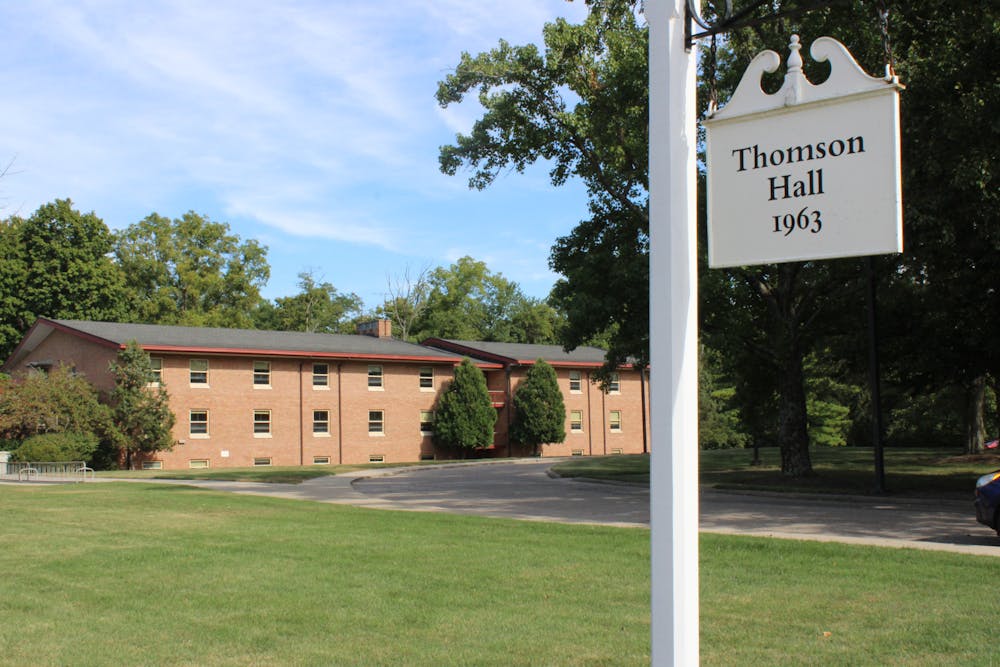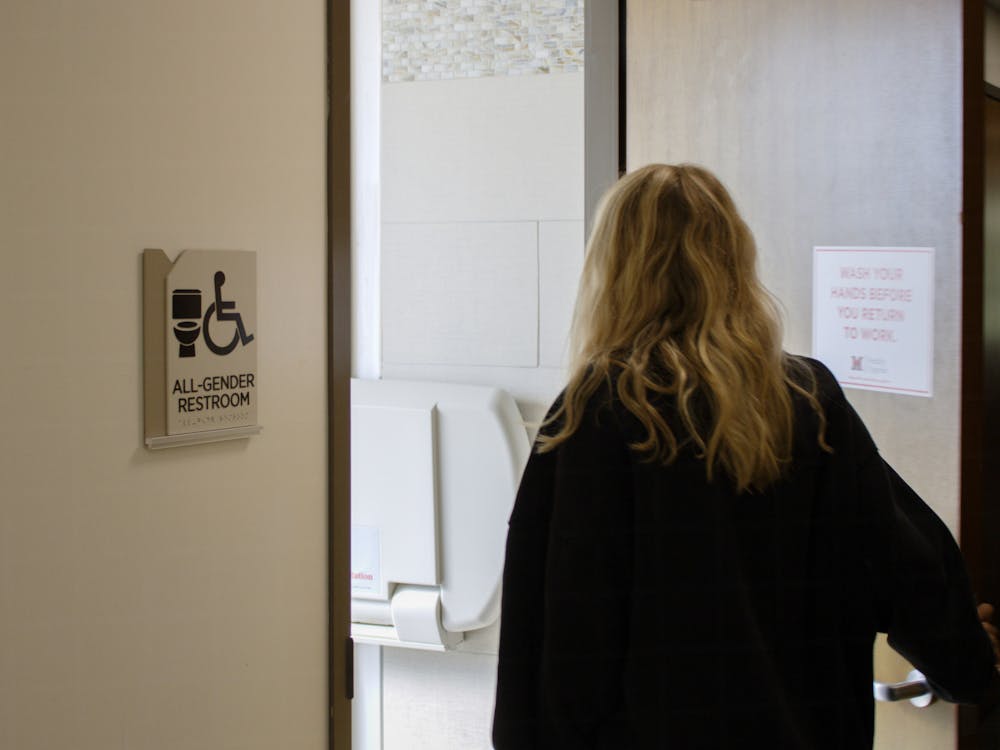Abby Bunch never imagined her first year in college would result in eight doctor visits, four trips to the university clinic, roughly two weeks of missed classes and an impending surgery.
Two years later, Bunch says she blames Thomson Hall.
The junior studio art major lived in the basement room 36 with her then-roommate Laura Nielsen, a junior primary education major. While there, she said dehumidifiers lined the hallway by the bathroom, she would climb into wet sheets at night and mold grew in their air conditioner.
Within the first six weeks of school, Bunch said she started getting sick more often, and couldn’t figure out why her symptoms weren’t going away.
However, the doctor at Miami University’s student health clinic diagnosed it as allergies.
“He just told me to keep taking allergy medicine and I did, and I just kept getting worse,” Bunch said. “I kept going back in being like, ‘No, you’re lying. You’re lying. I’m pretty sure it’s mold poisoning.’ And they were like, ‘it’s not.’”
After a while, Bunch said she gave up hope on the clinic because they weren’t listening to her.
She ended up going to a different doctor in Indiana during fall break in 2022, where they diagnosed her with mold poisoning. Shortly after returning from break, Bunch started expressing to her resident assistants (RA) and resident directors that her living conditions continuously caused her to be sick.
“My entire floor was always sick,” Bunch said, “and it was the same thing I had.”
According to emails given to The Miami Student, Bunch and Nielsen put in a maintenance request on Oct. 24 for someone to inspect their room and AC unit because of a Petri dish test Bunch had done. The test showed mold in the air.
After Bunch and Nielsen contacted their RA regarding the test results of the Petri dish Bunch bought off Amazon, she said the RAs didn’t believe them.
Nielsen said she felt skeptical, too, because she wasn’t experiencing any of the symptoms that Bunch or the other residents were experiencing.
Enjoy what you're reading?
Signup for our newsletter
“To be honest, at first, I kind of didn’t buy into it,” Nielsen said. “I kind of thought, ‘Yeah, right. It’s probably just strep. You’re a freshman. We all get strep. There’s no way they would put us in this building if there was mold.’”
However, after a while, Nielsen said she too started to feel uncomfortable about the possible mold.
Miami’s response
The university brought in Jeff Johnson, the director of the environmental health and safety offices, to take a look at their room. According to Johnson’s meeting notes, he inspected the room twice, once in October of 2022 and the other a month later in November.
Johnson said his office and a third-party consultant found nothing to suggest any mold problems in the building.
He added that they’re constantly on the lookout for what he calls “mold amplification” in any of the buildings on campus. It’s anytime a building product is actively being used as a food source for mold to grow on including ceiling tiles and drywall.
“So when you take a look at a building through that lens, Thomson Hall is actually from a mold standpoint, one of the least concerns from a health perspective,” Johnson said, “because the walls are all made out of cinder block.”
According to Miami’s Indoor Environmental Air Quality page, black mold is extremely rare to find in the residence halls because it requires a constant water source and isn’t found on hard, non-porous surfaces such as ceramic, aluminum, sheet metal (vents), etc.
Mold exposure can irritate the eyes, skin, nose, throat and lungs of both mold-allergic and non-allergic people. Symptoms other than the allergic and irritant types are not commonly reported as a result of inhaling mold, according to the United States Environmental Protection Agency.
Bunch said her symptoms ranged from random allergic reactions and hives due to a weakened immune system, a constant cough mixed with breathing issues, a congested nose and puffy and irritated eyes.
Johnson added that a consultant Miami hired extensively looked at the window AC units in 2021. According to the 2021 Building Inspection and Air Quality Testing report, the consultant took air samples in randomly selected rooms throughout the building and found no mold amplification, even in a dirty window unit.
Johnson said that mold can be found everywhere in the environment, so the key is to keep it below the levels one would find outdoors, and that said Petri dishes aren’t a reliable way to sample for mold in the air because many things can land on the dish.
“I think she found [the Petri dish] off Amazon,” Nielsen said. “I think it would have grown something no matter [what]. [But,] if someone comes to you with a concern you should look into it, as opposed to just kind of saying, ‘Well, no, it’s nonsense.’”
Near Christmas break, Nielsen said the dorm held a hall meeting for everyone to talk about their concerns. A majority of residents said they didn’t feel safe or healthy in the current environment.
Bunch said that once a week the building janitor would go into their room and spray bleach into the AC unit as well.
“I couldn’t go to class because I was sick,” Bunch said. “I couldn’t do anything except for laying in my bed, but being in my room made it worse, so I wasn’t getting better.”
She added that when returning to campus after winter break, she wasn’t able to move buildings for financial reasons and immediately got sick again after being treated over J-term for back-to-back sinus infections.
What happens next
In January 2024, Bunch learned that her nose collapsed. In May her doctor referred her to a surgeon.
This December, Bunch said she’s having surgery to fix the effects of her chronic sinus infections which include an excess of tissue in her nose and a deviated septum, both of which are causing breathing issues.
Bunch said Miami isn’t helping financially because she didn’t have enough records.
Miami did not respond by the time of this publication to a request for data about how many complaints were filed against Thomson Hall and what follow-up communication Miami had with residents pertaining to dehumidifiers.
Robert Bell, director of planning, architecture and engineering, wrote in an email to The Miami Student that Thomson Hall isn’t being used for housing this year because of plans to demolish the building to use the land for mounted solar panels.
Bell wrote the university wants the site ready for solar construction by the summer of 2025, and the university will demolish the building in the coming months.




